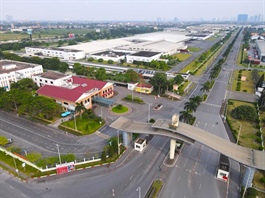Ministry urges higher tax rate for swing trading of real estate
Ministry urges higher tax rate for swing trading of real estate
The Ministry of Justice has proposed higher tax rates on the swing trading of real estate assets to prevent speculation and a market bubble.

The proposal was raised in a draft report on the programme of developing laws and ordinances in 2024, which will be submitted to the Government for consideration.
The ministry proposes studying sellers' personal income tax rates based on ownership duration. Higher tax rates would be imposed on real estate owners with short ownership periods to prevent speculation and a real estate bubble.
The current tax rate on income from real estate transfers is fixed at 2 per cent.
The ministry said that sellers and buyers often declare the notarised contract price lower than the actual purchase price, so they can reduce the tax owed, causing significant tax collection losses.
The ministry said higher tax rates should be applied to incomes from the swing trading of real estate assets.
Some countries use tax instruments to increase the cost of speculation and reduce the attractiveness of real estate speculation. According to the ministry, some countries imposed a tax on profits earned from real estate transactions basing on the frequency of transactions and duration of ownership.
The ministry pointed out that two major taxes were imposed in Germany to prevent real estate speculation, including real estate transfer and income taxes. The income tax ranged from 14-42 per cent.
Individuals selling real estate assets would be exempt from income tax if they owned the property for more than ten years or were not considered to be using it for business purposes. Properties of owners who had three real estate transactions in five years would be considered for business purposes.
Each state's policies against real estate speculation are different in the US.
In San Francisco, California, people who buy and sell several properties within five years are subject to a transfer tax at a rate of 24 per cent if the transaction was in the first year of ownership, 22 per cent in the second year of ownership, 20 per cent in the third year, 18 per cent in the fourth year and 14 per cent in the fifth year.
In Singapore, a land transaction in the first year of ownership is imposed with a tax rate of 100 per cent in the net, 50 per cent in the second year and 25 per cent in the third year.
In Malaysia, the tax rate was 30 per cent for the ownership duration of fewer than three years, 20 per cent for 3-4 years and 15 per cent for 4-5 years.
In Taiwan, the tax rate is 15 per cent for the transaction in the first year of ownership and 10 per cent in the second year.
In Viet Nam, appropriate tax rates on incomes from real estate transactions based on the duration of ownership would help prevent speculation, the Ministry of Justice said, adding that the tax rates must be studied carefully to regulate the market properly.
At the same time, the application of income taxes on real estate transfers based on the ownership duration must be synchronised with the process of completing policies related to land and housing, and the readiness of the information technology infrastructure for land and property registration.
The draft amendment to the Law on Land also mentions higher tax rates for people who used large areas of land, owned many houses, invested in land for swing trading, and were slow in putting land into use or abandoning it.
General Department of Taxation statistics showed that tax collected from real estate transfer was estimated at more than VND41 trillion in 2022, nearly double that of 2021. The increase was thanks to tackling false declarations of prices in transferring real estate and robust transactions in the first half of the year.
The Ministry of Justice also proposed other incomes to be considered taxable, including incomes from the transfer of domains, mobile phone numbers and vehicle registration plates, and studying separate tax regulations for derivatives transfer due to the differences between derivatives and stocks.
Derivative investors do not have the same rights as stockholders, such as the right to attend shareholder meetings or receive dividends.
The current tax rate on income from securities transfers is 0.1 per cent.

























